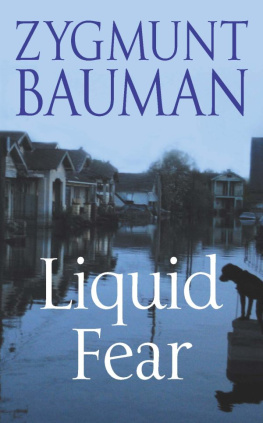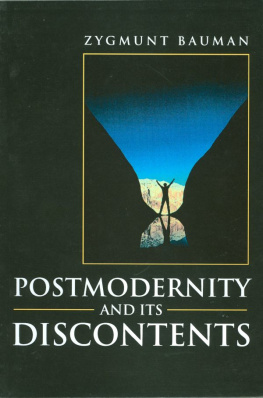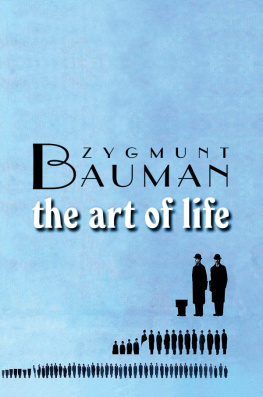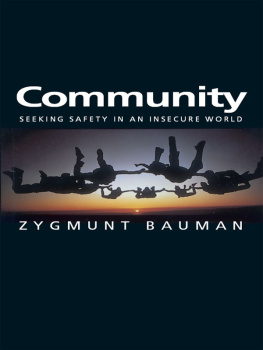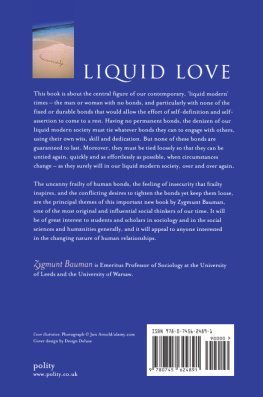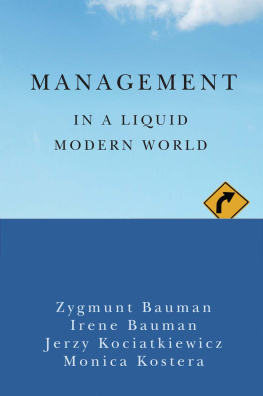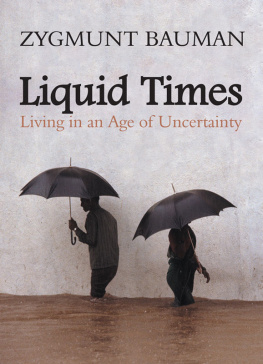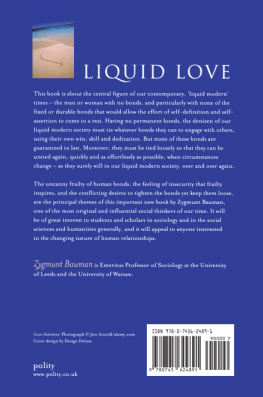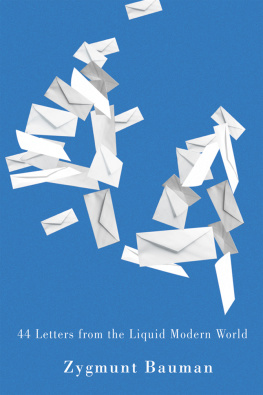Bauman - Liquid Fear
Here you can read online Bauman - Liquid Fear full text of the book (entire story) in english for free. Download pdf and epub, get meaning, cover and reviews about this ebook. year: 2011, publisher: Wiley, genre: Romance novel. Description of the work, (preface) as well as reviews are available. Best literature library LitArk.com created for fans of good reading and offers a wide selection of genres:
Romance novel
Science fiction
Adventure
Detective
Science
History
Home and family
Prose
Art
Politics
Computer
Non-fiction
Religion
Business
Children
Humor
Choose a favorite category and find really read worthwhile books. Enjoy immersion in the world of imagination, feel the emotions of the characters or learn something new for yourself, make an fascinating discovery.
- Book:Liquid Fear
- Author:
- Publisher:Wiley
- Genre:
- Year:2011
- Rating:5 / 5
- Favourites:Add to favourites
- Your mark:
- 100
- 1
- 2
- 3
- 4
- 5
Liquid Fear: summary, description and annotation
We offer to read an annotation, description, summary or preface (depends on what the author of the book "Liquid Fear" wrote himself). If you haven't found the necessary information about the book — write in the comments, we will try to find it.
Liquid Fear — read online for free the complete book (whole text) full work
Below is the text of the book, divided by pages. System saving the place of the last page read, allows you to conveniently read the book "Liquid Fear" online for free, without having to search again every time where you left off. Put a bookmark, and you can go to the page where you finished reading at any time.
Font size:
Interval:
Bookmark:

Copyright Zygmunt Bauman 2006
The right of Zygmunt Bauman to be identified as Author of this Work has been asserted in accordance with the UK Copyright, Designs and Patents Act 1988.
First published in 2006 by Polity Press
Polity Press
65 Bridge Street
Cambridge CB2 1UR, UK
Polity Press
350 Main Street
Malden, MA 02148, USA
All rights reserved. Except for the quotation of short passages for the purpose of criticism and review, no part of this publication may be reproduced, stored in a retrieval system, or transmitted, in any form or by any means, electronic, mechanical, photocopying, recording or otherwise, without the prior permission of the publisher.
ISBN-10: 0-7456-3679-9
ISBN-13: 978-07456-3679-5
ISBN-10: 0-7456-3680-2 (pb)
ISBN-13: 978-07456-3680-1(pb)
ISBN-13: 978-07456-5450-8 (Single-user ebook)
ISBN-13: 978-07456-5449-2 (Multi-user ebook)
A catalogue record for this book is available from the British Library.
Every effort has been made to trace all copyright holders, but if any have been inadvertently overlooked the publishers will be pleased to include any necessary credits in any subsequent reprint or edition.
For further information on Polity, visit our website: www.polity.co.uk
Introduction: On the Origin, Dynamics and Uses of Fear
Fear has many eyes
And can see things underground
Miguel de (Saavedra) Cervantes, Don Quixote
You dont need a reason to be afraid I got frightened, but it is good to be afraid knowing why
mile Ajar (Romain Gary), La Vie en soi
Let me assert my firm belief that the only thing we have to fear is fear itself.
Franklin Delano Roosevelt, Inaugural Address, 1933
Bizarre, yet quite common and familiar to all of us, is the relief we feel, and the sudden influx of energy, and courage, when after a long time of uneasiness, anxiety, dark premonitions, days full of apprehension and sleepless nights, we finally confront the real danger: a menace we can see and touch. Or perhaps this experience is not as bizarre as it seems if, at long last, we come to know what was standing behind that vague but obstinate feeling of something awful and bound to happen which kept poisoning the days we should be enjoying, yet somehow could not and which made our nights sleepless Now that we know where the blow is coming from, we know also what, if anything, we can do to repel it or at least weve learned just how limited our ability is to emerge unharmed and what kind of loss, or injury, or pain we have to accept.
We have all heard stories about cowards who turned into fearless fighters when they were faced with a real danger; when the disaster they had been expecting day in, day out, but had tried in vain to imagine, finally struck. Fear is at its most fearsome when it is diffuse, scattered, unclear, unattached, unanchored, free floating, with no clear address or cause; when it haunts us with no visible rhyme or reason, when the menace we should be afraid of can be glimpsed everywhere but is nowhere to be seen. Fear is the name we give to our uncertainty : to our ignorance of the threat and of what is to be done what can and what cant be to stop it in its tracks or to fight it back if stopping it is beyond our power.
The experience of living in sixteenth-century Europe the time and the place when and where our modern era was about to be born was crisply, and famously, summed up by Lucien Febvre in just four words: Peur toujours, peur partout (fear always and everywhere). Febvre connected that ubiquitousness of fear to darkness, which started just on the other side of the hut door and wrapped the world beyond the farm fence; in the darkness anything may happen, but there is no telling what will. Darkness is not the cause of danger, but it is the natural habitat of uncertainty and so of fear.
Modernity was to be the great leap forward: away from that fear and into a world free of blind and impermeable fate that greenhouse of fears. As Victor Hugo ruminated, wistfully and waxing lyrical on occasion: ushered in by science (the political tribune will be transformed into a scientific one), a time will come of an end to surprises, calamities, catastrophes but also of an end to disputes, illusions, parasitisms In other worlds, a time free of all that stuff of which fears are made. What was to be a route of escape, however, proved instead to be a long detour. Five centuries later, to us standing at the other end of the huge graveyard of dashed hopes, Febvres verdict sounds again remarkably apt and topical. Ours is, again, a time of fears.
Fear is a feeling known to every living creature. Humans share that experience with the animals. Students of animal behaviour have described in great detail the rich repertoire of animal responses to the immediate presence of a menace threatening their life which all, as in the case of humans facing a threat, veer between the alternatives of escape and aggression. Humans, however, know in addition something else: a sort of second degree fear, a fear, so to speak, socially and culturally recycled, or (as Hugues Lagrange in his fundamental study of fear calls it) a derivative fear that guides their behaviour (having first re-formed their perception of the world and the expectations guiding their behavioural choices) whether or not a menace is immediately present. Secondary fear may be seen as a sediment of a past experience of facing the menace point blank a sediment that outlives the encounter and becomes an important factor in shaping human conduct even if there is no longer a direct threat to life or integrity.
Derivative fear is a steady frame of mind that is best described as the sentiment of being susceptible to danger; a feeling of insecurity (the world is full of dangers that may strike at any time with little or no warning) and vulnerability (in the event of the danger striking, there will be little if any chance of escape or successful defence; the assumption of vulnerability to dangers depends more on a lack of trust in the defences available than on the volume or nature of actual threats). A person who has interiorized such a vision of the world that includes insecurity and vulnerability will routinely, even in the absence of a genuine threat, resort to the responses proper to a point-blank meeting with danger; derivative fear acquires a self-propelling capacity.
It has been, for instance, widely noted that the opinion that the world out there is dangerous and better to be avoided is more common among people who seldom, if ever, go out in the evenings, when the dangers seem to them most terrifying; and there is no way of knowing whether such people avoid leaving their homes because of their sense of danger, or whether they are afraid of the unspoken dangers lurking in dark streets because, in the absence of practice, they have lost the confidence-giving ability to cope with the presence of a threat, or because, lacking direct personal experiences of threat, they are prone to let their imaginations, already afflicted by fear, run loose.
Dangers one is afraid of (and so also the derivative fears they arouse) may be of three kinds. Some threaten the body and the possessions. Some others are of a more general nature, threatening the durability and reliability of the social order on which security of livelihood (income, employment), or survival in the case of invalidity or old age, depend. Then there are dangers that threaten ones place in the world a position in the social hierarchy, identity (class, gender, ethnic, religious), and more generally an immunity to social degradation and exclusion. Numerous studies show, however, that derivative fear is easily decoupled in the sufferers awareness from the dangers that cause it. People it afflicts with the sentiment of insecurity and vulnerability may interpret a derivative fear by reference to any of the three types of dangers independently of (and often in defiance of) the evidence of their relative contributions and responsibility. The resulting defensive or aggressive reactions aimed at mitigating the fear may be therefore targeted away from the dangers truly responsible for the presumption of insecurity.
Font size:
Interval:
Bookmark:
Similar books «Liquid Fear»
Look at similar books to Liquid Fear. We have selected literature similar in name and meaning in the hope of providing readers with more options to find new, interesting, not yet read works.
Discussion, reviews of the book Liquid Fear and just readers' own opinions. Leave your comments, write what you think about the work, its meaning or the main characters. Specify what exactly you liked and what you didn't like, and why you think so.

